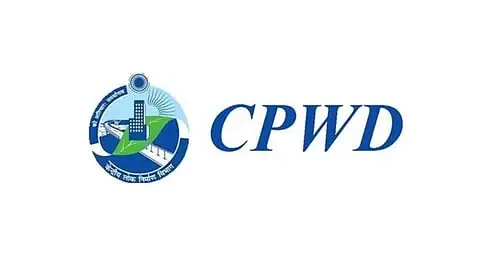CPWD Registration
Service
CPWD Registration

Employ Legal Vedas to Complete CPWD Contractor Registration Easily
Hi there! We appreciate you selecting Legal Vedas for your company's registration requirements. As of 2024, businesses operating in the infrastructure and construction industries must register with the Central Public Works Department (CPWD). It enables you to formally participate in high-value projects that can propel your company to new heights and grants you access to lucrative government tenders.
By demonstrating adherence to stringent regulatory requirements, becoming CPWD registered not only improves your chances of obtaining government contracts but also enhances your credibility. From paperwork to submission, we at Legal Vedas streamline the entire CPWD registration process. Our staff makes sure your application is handled quickly and without errors so you can concentrate on expanding your company while we take care of the rest.
What Makes CPWD Registration Crucial for Your Company?
Access to the Central Public Works Department's bids and related projects is one of the main advantages of CPWD registration. You would lose out on important growth prospects if you couldn't bid on these government projects with a valid CPWD Enlistment.
To remain eligible for future tenders, you can extend your CPWD Enlistment, which is good for five years. If you have a solid record, the renewal process is simple and guarantees that you will continue to take advantage of these chances.
Possessing a CPWD license increases your legitimacy. It proves that your business satisfies strict financial and technical requirements, making you a top option for customers looking for trustworthy contractors.
Your CPWD Contractor Registration classification (I(Super), I(AAA), I(AA), I(A), I, II, III, IV, V) as a contractor is determined by your experience and financial capability. There is a tendering limit for each class that establishes the highest projected cost of projects you can bid on. You are able to take on more significant and fulfilling work as your class level increases since you can access larger projects.
You can connect with a large network of government organizations, public sector projects, and other contractors by registering as a CPWD Contractor. This network can result in beneficial business partnerships and opportunities, which can help you expand your company.
It can be difficult to navigate the CPWD Online Registration and the CPWD Contractor Registration Eligibility. However, you can expedite the CPWD Registration Process with the help of CPWD Registration Consultants like us. From comprehending CPWD Contractor Registration Fees to creating and submitting the required CPWD Registration Documents, we take care of everything.
Book A Consultation
How can we help you?
Need Help with Legal Drafting or Registration? Talk to Our Experts Now!
Our Assurance
Transparent & Timely Service
There are no hidden fees or delays—only straightforward communication, quick turnaround, and dependable legal support from start to finish.
Accuracy & Compliance
We ensure that every legal document and process is drafted precisely and in complete compliance with current laws and government regulations.
Confidentiality Guaranteed
Your personal information and legal documents will be treated with strict secrecy and data security. We maintain confidentiality with care
Concerns Getting Registered as a CPWD
Create trendy looking dark boxes with a title background.
1. Limitations on Resources
4. The complicated nature of laws and rules
1. Inadequate expertise and understanding
3. Technical Challenges
5. Examining Documents and Administrative Hold-Ups
6. Minimal Correctional Opportunities
Comprehending the Registration of CPWD Contractors
The Indian government agency in charge of managing public sector construction projects, such as buildings, roads, bridges, and other structures like stadiums and auditoriums, is the Central Public Works Department (CPWD). The Director General (DG), who is also the Government of India's Principal Technical Advisor, leads the CPWD, which was founded in July 1854 by Lord Dalhousie and is housed within the Ministry of Housing and Urban Affairs.
The purpose of hiring contractors
Keeping a ready list of capable and qualified contractors is the major objective of CPWD Contractor Registration. By reducing the need for frequent credential verification, this approach expedites the project assignment process and guarantees that only qualified contractors are hired for CPWD work.
Eligibility for CPWD Contractor Registration
An applicant must have one of the following statuses in order to be eligible to enlist as a contractor in a CPWD:
- An Individual, who is a citizen of India.
- Public Limited Company
- Private Limited Company
- Sole proprietorship
- Partnership firm
- Limited Liability Partnership
It is not possible for a contractor to be enrolled under more than one category name.
Although a contractor can enroll in more than one category, they cannot enroll in more than one class within the same category.
For a year following his retirement from service, no engineer or other official working in engineering or administrative capacities in any engineering department of India, the State, the Central Government, or State PSUs may work for CPWD as an employee of the contractor or as a contractor themselves unless they have first received permission from their employer, the government.
A director or partner of the business who has already been hired as a contractor is not eligible to be hired as a partner or the
Validity of Enrollment for CPWD
The duration of your CPWD enlistment is five years from the date of approval. You can bid on projects in your registered class and category and take part in tenders during this time.
Important Points:
Validity Time frame: five years from the approval date.
Renewal: In order to continue taking part in CPWD projects and tenders, you must submit an application for renewal before the end of the five-year period.
Continuous Eligibility: To guarantee a seamless renewal, continue to adhere to CPWD norms and procedures.
Frequently Asked Questions (FAQs)
In essence, CPWD Contractor Registration is your pass to work on government projects overseen by India's Central Public Works Department (CPWD). This registration is essential if you're a contractor hoping to work on large public construction projects, such as constructing stadiums, bridges, or highways.
Why Sign Up?
You are unable to bid on CPWD tenders without it. The registration determines the size and kind of projects you can manage by classifying you according to your financial capability and experience.
Classifications & Types: There are particular categories and classes (ranging from Class I(Super) to Class V) that correspond to your level of expertise and experience, regardless of whether your specialty is horticulture or building and roads. Your status is valid for five years after you register. In order to continue bidding on projects after that, you will need to renew.
A few essential requirements must be fulfilled in order to obtain CPWD Contractor Registration. The rundown is as follows:
1. Experience Is Important
Work Experience: It's fantastic if you have prior project management experience! Your chances are better the more experience you have, especially for higher courses.
2. Turnover and Financial Health Net Worth: You must demonstrate that you have the resources to manage significant initiatives. This entails having a specific yearly turnover and net worth.
A certificate of banker's or net worth: These records serve as evidence of your sound financial standing.
3. Education Is Important for Engineers and Architects: You're on the correct track if you have a degree or diploma from an accredited university in architectural, mechanical, electrical, or civil engineering.
If you're aiming for the horticulture sector, a bachelor's degree in agriculture or horticulture helps.
4. Paperwork Legal and Administrative Documents: You will need to provide documents such as a power of attorney, proof of your job experience, and proof of how your firm was set up (such as partnership papers or incorporation certificates).
5. Particular Points to Remember
Former Government Employees: You will require certain paperwork and pathways if you have served in the government.
In each category, "class" refers to the enlistment class under these regulations.
CPWD is divided into two categories: i. Buildings & Roads (B&R) and ii. Horticulture.
A "building" is any residential or non-residential construction that is completed under a single contract and includes foundation, walls, floors, roofs, and finishing, civil, and electrical services.
"Building work" can refer to any of the following: (i) building a residential or non-residential structure (complete with flooring, roofs, walls, foundation, finishing, and civil and electrical services), (ii) Building a residential or non-residential structure's balance work in the event of an unfinished contract, such as a contract that has been canceled or repossessed, The addition of extra floors, (iv) building a border wall, (v) upkeep, repairs, additions, modifications, renovations, and upgrades, (vi) SITC electrical/E&M installations and services, such as oxygen plants and rooftop solar plants, (vii) Building a sump underground, (viii) Parking construction, (ix) Building a sewage treatment facility, (x) Building water treatment facilities, (xi) Building wastewater treatment facilities,(xii) Overhead tank construction; (xiii) water supply; (xiv) sewerage; and (xv) drainage. Any of the aforementioned tasks, alone or in combination, will be considered construction work. with the following exceptions: (i) independent material supply projects; (ii) labor-intensive projects such as housekeeping, sweeping, caregiving, watch and ward, and the operation and maintenance of mechanical and electrical services through original equipment manufacturers.
The word "tendering limit" refers to the maximum amount that an enlisted contractor may bid up to, as established by the projected cost of a task of a particular category.
No, contractors hired under one category are not permitted to bid on other categories' tenders.
CPWD registrations may be denied for the following common reasons:
Inaccurate or missing documents: Your application may be rejected if your documentation is incomplete or contains mistakes. Verify that you have all the required paperwork and that it is correct.
Inadequate Work Experience: You risk being rejected if you don't have the necessary amount of work experience or if you don't show that you've finished any projects.
Money Concerns: Your application may not be accepted if your financial documents don't satisfy the requirements for net worth or annual turnover.
Not Fulfilling Eligibility Requirements: Make sure you fulfill all the prerequisites for the class and category you're applying for, including technical know-how and educational credentials.
Application errors: Even little errors or discrepancies in your application form can lead to issues. Before submitting, make sure everything is correct.
Not Correcting Errors: Your application may be denied if you are asked to fix errors or submit more information and fail to do so within the allotted time.
Inspection Issues: A rejection may result from problems discovered during the inspection, such as inconsistencies in your documentation or setup.
Our Simple 3-Step Journey
Your Legal Path with Legal Vedas
Reach Out to Us
"Fill out the contact form, call us directly, or connect with our team on WhatsApp to share your legal service requirement.

Get Personalised Guidance
Our legal specialist will communicate with you, understand your requirements, and walk you through the paperwork or writing process.

Our Latest Blogs
Latest legal Information
Behind the word mountains, far from the countries Vokalia and Consonantia, there live the blind texts they live
Registeration
Subscribe Now
Don’t miss our future updates! Get Subscribed Today!
©2025. Legal Vedas. All Rights Reserved.


